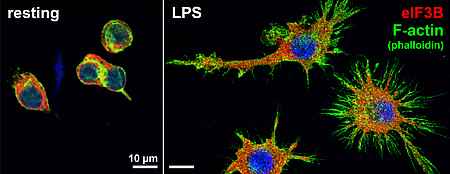Sie befinden sich hier
Inhalt
Cells of the innate immune system react to infection or injury by mounting rapid immune responses, thereby orchestrating inflammation and wound healing. The Biochemistry Division aims at understanding the responsiveness of macrophages by exploring their capacity to regulate gene expression at the posttranscriptional level. We analyze the molecular mechanisms by which macrophages control the translation and degradation of specific mRNAs.
Through these regulatory networks, RNA-binding proteins and cognate recognition motifs in mRNAs ensure that activation of inflammatory genes such as cytokines is rapid and transient, and that anti-inflammatory factors restrict the extent and duration of immune responses. Our studies identify posttranscriptional control mechanisms as an essential regulatory principle that drives the dynamics of immune and inflammatory responses.
Key Publications
Schott J, Reitter S, Philipp J, Haneke K, Schäfer H, Stoecklin G. Translational regulation of specific mRNAs controls feedback inhibition and survival during macrophage activation. PLoS Genet. 2014;10(6):e1004368.
Leppek K, Schott J, Reitter S, Poetz F, Hammond MC, Stoecklin G. Roquin promotes constitutive mRNA decay via a conserved class of stem-loop recognition motifs. Cell 2013;153:869-81.
Schott J, Stoecklin G. Networks controlling mRNA decay in the immune system. Wiley Interdiscip Rev RNA 2010;1:432-56.

